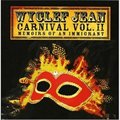Wyclef Jean 1972年出生于加勒比岛国海地,9岁的时候移民美国,之后定居于新泽西州,在那里开始了他的音乐生涯。高中的时候他就和好友Prakazrel Michel以及同学Lauryn Hill组建了自己的音乐组合。当初他们管自己叫Tranzlator Crew,后来才改名为The Fugees.之后他们和Ruffhouse唱片签约,1993年发行了首张专辑Blunted On Reality,但是这张专辑的成绩相当的差,但是他们没有气馁,第二张专辑The Score全球发行超过1700万张,也成为了嘻哈音乐史上一张伟大的专辑。1997年,Jean以首张专辑The Carnival(Wyclef Jean Presents the Carnival Featuring the Refugee All-Stars )开始了自己的单飞事业。一大批的音乐人加入到这张专辑的制作和演唱之中,两支单曲"We Trying to Stay Alive" 和"Gone Til November" 成为了Jean的代表之作。
第一张专辑成功之后,Jean不断与一批优秀的音乐人进行合作,第二张专辑The Ecleftic: 2 Sides II a Book也于2000年发行,一大批歌手参与了专辑的演唱部分,专辑的评价有褒也有贬,大部分人则认为这张专辑有些漫无边际(with many calling the album scattershot)。2002年,第三张专辑Masquerade,这张专辑中Jean重新制作了Bob Dylan和Frankie Valli的一些歌曲,并和Tom Jones以及以色列小提琴家Miri Ben-Ari进行合作。专辑进入了公告牌的第六名,商业上获得了较大的成功,而评论界则对这张专辑颇有微辞
Lead Fugees rapper and sometime guitarist Wyclef Jean was the first member of his group to embark on a solo career, and he proved even more ambitious and eclectic on his own. As the Fugees hung in limbo, Wyclef also became hip-hop's unofficial multicultural conscience; a seemingly omnipresent activist, he assembled or participated in numerous high-profile charity benefit shows for a variety of causes, including aid for his native Haiti. The utopian one-world sensibility that fueled Wyclef's political consciousness also informed his recordings, which fused hip-hop with as many different styles of music as he could get his hands on (though, given his Caribbean roots, reggae was a particular favorite). In addition to his niche as hip-hop's foremost global citizen, Clef was also a noted producer and remixer who worked with an impressive array of pop, R&B, and hip-hop talent, including Whitney Houston, Santana, and Destiny's Child, among many others.
The son of a minister, Nelust Wyclef Jean was born in Croix-des-Bouquets, Haiti, on October 17, 1972. When he was nine, his family moved to the Marlborough projects in Brooklyn, NY; by his teenage years, Jean had moved to New Jersey, taken up the guitar, and begun studying jazz through his high school's music department. In 1987, he also joined a rap group with his cousin Prakazrel Michel (aka Pras) and Michel's high-school classmate Lauryn Hill. Initially calling themselves the Tranzlator Crew, they evolved into the Fugees, a name taken from slang for Haitian refugees. The trio signed with Ruffhouse Records in 1993 and released their debut album, Blunted on Reality, the following year; it attracted little notice, thanks to an inappropriate hardcore stance that the group wore like an ill-fitting suit. But the Fugees hit their stride on the follow-up, The Score, ignoring popular trends and crafting an eclectic, bohemian masterpiece that sounded like nothing else on the hip-hop landscape in 1996. Thanks to hit singles like "Fu-Gee-La" and "Killing Me Softly," The Score became a chart-topping phenomenon; in fact, with sales of over six million copies, it still ranks as one of the biggest-selling rap albums of all time.
Wyclef Jean was the first Fugee to declare plans for a solo project, setting to work soon after the group completed its supporting tours. Released in the summer of 1997, The Carnival (full title: Wyclef Jean Presents the Carnival Featuring the Refugee All-Stars) was even more musically ambitious than The Score. Its roster of guests included not only the remainder of the Fugees, but also Jean's siblings (who performed together in the duo Melky Sedeck), Cuban legend Celia Cruz, New Orleans funk mainstays the Neville Brothers, and Bob Marley's female backing vocalists the I Threes. The breadth of his ambition was further in evidence on the album's two hit singles; "We Trying to Stay Alive" recast the Bee Gees' signature disco tune as a ghetto empowerment anthem, and the Grammy-nominated "Gone Till November" was recorded with part of the New York Philharmonic Orchestra. Those two songs helped push The Carnival into a Top 20, triple-platinum showing, and most reviews were naturally quite positive.
In the wake of The Carnival, Wyclef stepped up his outside work for other artists; over the next few years, he collaborated as a producer, songwriter, and/or remixer with a typically diverse list of artists: Destiny's Child ("No No No"), Sublime, Simply Red, Whitney Houston (the title track of her My Love Is Your Love album), dancehall reggae star Bounty Killer, Cypress Hill, Michael Jackson, Eric Benet, Mya, Santana ("Maria Maria"), Tevin Campbell, the Black Eyed Peas, Kimberly Scott, Sinéad O'Connor, Mick Jagger, and Canibus. Clef also served as Canibus' manager for a short time in 1998; prior to their split, a report surfaced that Wyclef had pulled a gun on Blaze editor Jesse Washington over a negative Canibus review the magazine was slated to run (Wyclef vehemently denied the accusation, and no charges were filed).
By the time Wyclef began work on his second solo album, rumors were flying about tension between individual Fugees, and despite their denials, the fact that no follow-up to The Score was in sight seemed to lend credence to all the speculation. Although Wyclef had previously announced he would put off his sophomore effort until after the next Fugees album, he was well into the project by early 2000, giving an early release the antipolice brutality track "Diallo" (with guest vocals from Senegalese superstar Youssou N'Dour) via the Internet. The full album, titled The Ecleftic: 2 Sides II a Book, was released toward the end of the summer and entered the charts at number nine. Besides N'Dour, guests this time around included Mary J. Blige (on the Grammy-nominated duet "911"), Earth, Wind & Fire, Kenny Rogers, and even wrestling star the Rock ("It Doesn't Matter"); Clef also threw in a left-field cover of Pink Floyd's "Wish You Were Here." This time around, some critics suggested that Wyclef's sprawling ambitions were growing messy, but the record went platinum nonetheless. Shortly after its release, he also started up his own record label, Yclef.
With no Fugees reunion in sight, Wyclef began preparing his third solo album, Masquerade, in 2001; he also appeared in the Jamaican gangster flick Shottas, and, sadly, suffered the death of his father in a home accident. Masquerade was released in the summer of 2002, and in addition to the usual worldbeat fusions, it found Wyclef reworking songs by Bob Dylan and Frankie Valli, and featured guest shots from Tom Jones and Israeli violinist Miri Ben-Ari. Masquerade entered the charts at number six, proving that Wyclef's freewheeling approach still held quite a bit of appeal. One year later, he returned with The Preacher's Son, and also released an album of traditional Haitian Creole music, Welcome to Haiti: Creole 101. His debut solo album got its sequel in 2007 when Carnival, Vol. 2: Memoirs of an Immigrant hit the shelves. The album had a diverse and lengthy guest list, with Akon, Mary J. Blige, Norah Jones, Shakira, Paul Simon, and Sizzla being just some of the names involved.






